- At a glance: Pay transparency and whistleblower protections; expanded public health programs; education policy updates; stronger tenant and civil‑rights safeguards; new consumer disclosure and traffic rules.
Quick actions: Employers—review job postings, record‑retention practices, and employee notices; Employees—note new rights (pay transparency, whistleblower and family‑responsibility protections) and where to find help. For public health questions, consult the Illinois Department of Public Health guidance linked below.
Workplace Protections: Updated Labor Laws
Several new Illinois laws 2025 significantly expand employee rights and employer obligations in the workplace. These updates cover pay transparency, whistleblower protections, and nondiscrimination for family responsibilities — all of which affect how employers post jobs, keep records, and respond to employee disclosures.
Illinois Pay Transparency Act
Effective January 1, 2025, the Illinois Pay Transparency Act requires employers with 15 or more employees to include pay scales and benefits in all job postings. The amendment to the Equal Pay Act defines “pay scale and benefits” as the wage or salary range and a general description of benefits (for example, bonuses, stock options, or other incentives the employer reasonably expects to offer).

This requirement applies to positions performed at least partially in Illinois and to jobs outside the state where the employee reports to a supervisor or office in Illinois. Employers must also notify current employees about internal promotion opportunities within 14 business days of posting those opportunities externally.
Key compliance checklist for employers:
- Update all external and internal job postings to show a salary range and summary of benefits (pay range).
- Preserve pay scales, job postings, and promotion notices for at least 5 years in your records.
- Train HR staff on consistent posting rules for remote and hybrid roles that may be “part” in Illinois.
- Post an internal policy explaining how pay ranges are determined to reduce disputes and support transparency.
Note: Violations can result in civil penalties and the law prohibits retaliation against employees who assert their rights under the Act.
Whistleblower Protections (HB 5561)
Also effective January 1, 2025, amendments to the Illinois Whistleblower Act broaden protections for employees who report unlawful activities. The law now protects disclosures made to supervisors, board members, and organizations with contractual relationships to the employer — not only reports to government authorities.
Key points:
- The definition of “adverse action” includes any act that “could dissuade a reasonable worker from disclosing or threatening to disclose” protected information.
- Employees who make disclosures in good faith are protected from retaliation; employers should document investigations and retain records showing nondiscriminatory actions.
- Violations may lead to civil penalties and damages (penalty figures noted in statute — verify current amounts), so prompt corrective action and clear reporting channels are essential.
Practical example: an employee who reports suspected safety violations to a contractor with oversight duties is protected under the expanded definition of protected disclosures. Employers should ensure internal reporting options and anti‑retaliation protections are well publicized.
Family Responsibilities Protection
Effective January 1, 2025, HB 2161 amends the Illinois Human Rights Act to prohibit discrimination based on an employee’s “family responsibilities.” This covers actual or perceived caregiving — for example, providing basic medical or safety care for a child, elderly parent, or other family member.

Important implementation notes for employers:
- This protection does not automatically create a duty to provide accommodations or to change reasonable policies for leave, scheduling, productivity, or attendance — but employers should review their policies to avoid unintentional disparate impact.
- Document any employment decisions affecting employees with caregiving responsibilities to demonstrate consistent, nondiscriminatory treatment.
- Provide managers with guidance on permissible questions and job‑related performance expectations to reduce risk of unlawful bias.
Need Help Understanding New Workplace Laws?
Illinois employment law is changing. Employers: use our policy audit checklist to update postings, recordkeeping, and internal reporting channels. Employees: find out how to report concerns and protect your rights.
Education Reforms for 2025
Several new Illinois laws 2025 introduce changes that school districts, educators, parents, and students should track closely. These updates affect discipline rules, health and wellness programming, and future curriculum requirements — with some provisions mandatory and others permissive for local implementation.
Ban on Corporal Punishment (P.A. 103-0806)
Effective January 1, 2025, P.A. 103-0806 prohibits school personnel in public, charter, and non-public schools from engaging in corporal punishment. The statute defines “corporal punishment” as a discipline method that deliberately inflicts pain in response to behavior or language. School boards must update discipline policies to reflect this prohibition.

Practical guidance for districts:
- Mandate: Include the prohibition in board discipline policies and employee handbooks before the effective date.
- Train staff on alternative, positive-discipline strategies and documentation best practices.
- Note: This ban does not change rules allowing properly implemented physical restraint for student safety under other sections of the School Code.
Climate Change Education (P.A. 103-0837)
Beginning with the 2026–2027 school year, P.A. 103-0837 requires all public schools to provide instruction on climate change. The required curriculum elements include identifying environmental and ecological impacts of climate change on individuals and communities and evaluating solutions to mitigate those impacts.
Implementation notes:
- Timeline: Curriculum planning and teacher preparation should begin well before the 2026–2027 start year.
- Requirements: Districts should align new lessons with state standards and consider cross-disciplinary approaches (science, social studies, civics).
- Resources: The Illinois State Board of Education may provide model lessons or guidance — districts should monitor ISBE updates and training opportunities.
Relaxation Activities (P.A. 103-0764)
Starting January 1, 2025, P.A. 103-0764 allows school districts to provide students with at least 20 minutes per week of relaxation activities to support mental and physical health. These sessions are in addition to recess and can include mindfulness, guided breathing, or other wellness practices.

How schools can implement relaxation activities:
- Flexible options: Integrate 20 minutes into PE, social-emotional learning, or homeroom periods to avoid instructional disruption.
- Voluntary participation: Districts should clearly communicate that these activities are optional and provide alternatives for students with religious or personal objections.
- Measurement: Track participation and student feedback to evaluate health benefits and adjust programming.
“These educational reforms reflect our commitment to supporting the whole child, addressing both academic needs and social-emotional wellbeing in our schools.”
Quick actions for administrators: (1) Update discipline policies to remove corporal punishment, (2) plan for climate-change curriculum rollout by 2026–2027, (3) pilot relaxation activities now and gather parent/teacher feedback.
Public Health and Safety Initiatives
The Illinois Department of Public Health and other state agencies will implement several new public health measures in 2025 designed to reduce harms and improve environmental and individual safety. These laws expand access to harm‑reduction tools, require advance notice for pesticide applications in public spaces, and strengthen mold remediation oversight — all intended to protect community health across the state.
Fentanyl Test Strips (SB 3350)
Effective January 1, 2025, SB 3350 expands access to fentanyl test strips as part of overdose‑prevention strategies. The Illinois Department of Public Health (IDPH) is authorized to distribute test strips through hospitals and approved community organizations and to include them in harm‑reduction programs (for example, syringe‑exchange services) when feasible.
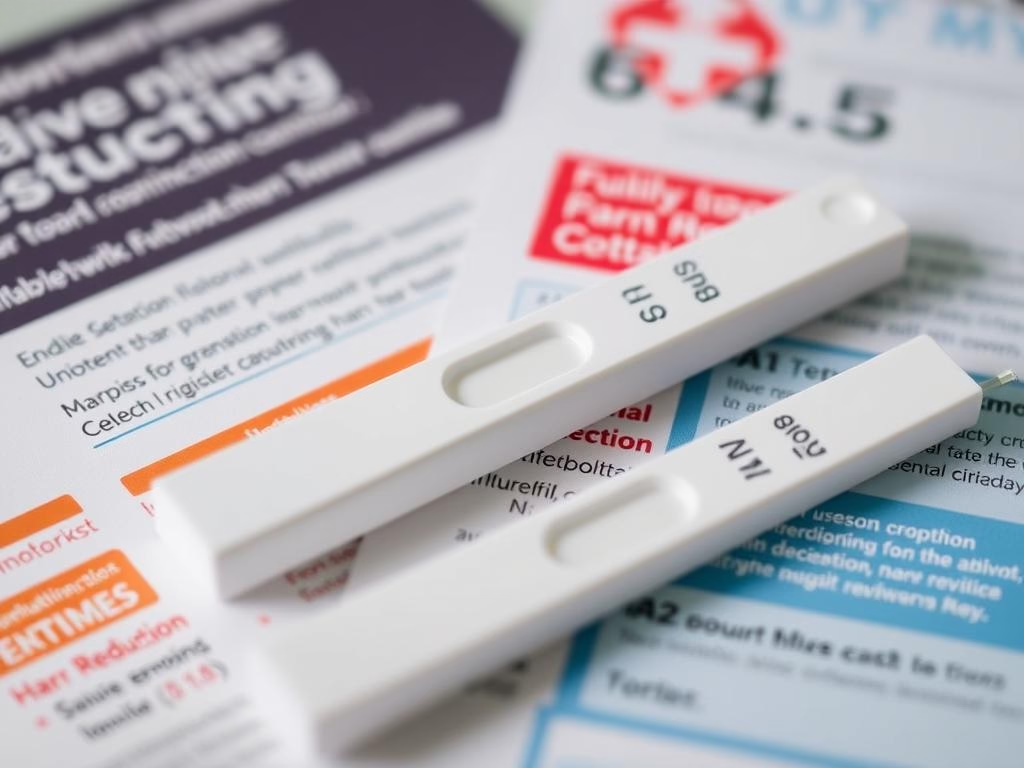
Practical guidance:
- Who can distribute: IDPH‑approved hospitals and community partners. Contact your local health department or IDPH for participation details and distribution schedules.
- Who can use them: Individuals and harm‑reduction programs; use instructions and educational materials should accompany test strips to reduce accidental misuse.
- Liability and training: Organizations should document safe distribution practices and provide clear instructions to recipients.
Pesticide Application Notice (SB 3342)
Starting January 1, 2025, SB 3342 requires that residents receive 24 hours’ written notice before pesticides (including mosquito‑abatement applications) are applied to public spaces near homes, unless an exception applies for urgent public health risks (for example, response to disease‑carrying insects or disaster recovery).
Implementation tips:
- Notice content: Notices should specify date, approximate time window, pesticide name or active ingredient, and a contact for more information.
- Exceptions: Emergency treatments for immediate health threats may proceed without prior notice; agencies should still provide follow‑up information when safe to do so.
- Where to get info: Check your municipal or county vector control office and state pesticide regulation pages for schedules and contact details.
Mold Remediation (SB 1087)
SB 1087 strengthens protections related to mold by directing the IDPH to run a public awareness campaign on mold health risks and remediation best practices. The law requires mold remediation providers to register with the state, demonstrate certification or training, and show financial responsibility (for example, insurance or bonding) as specified in the statute.
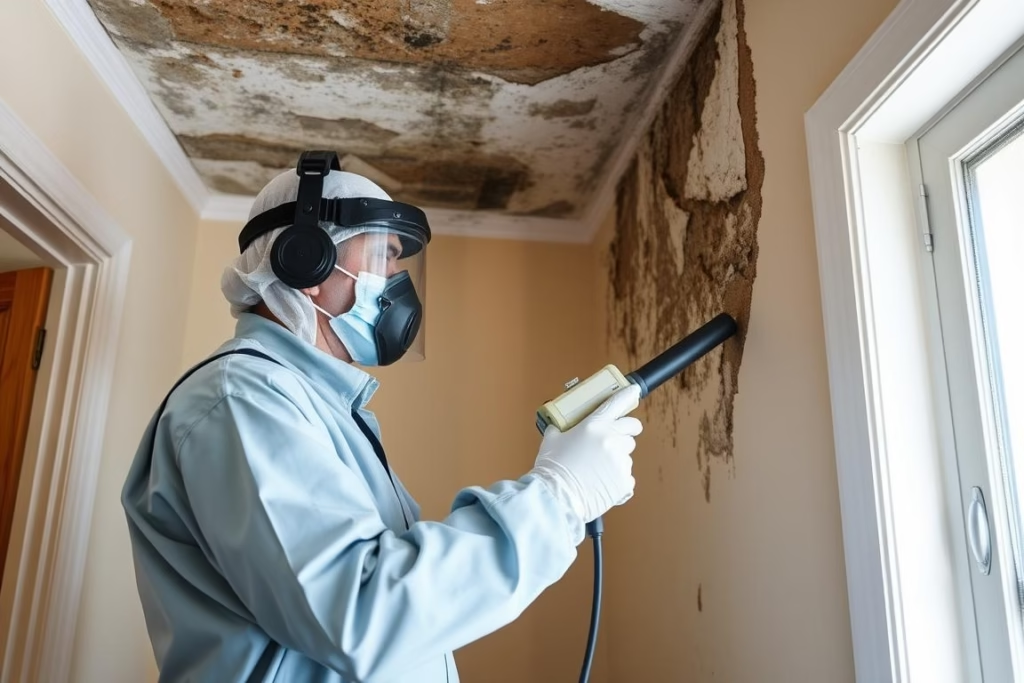
What residents and property owners should do:
- Before hiring: Ask remediation providers for registration proof, certification details, and evidence of financial responsibility.
- Health concerns: Individuals experiencing mold‑related health issues should consult medical providers and report large or recurring mold problems to local health authorities.
- State oversight: IDPH will report annually to lawmakers on health impacts and regulatory activity — monitor IDPH guidance for provider registration steps and consumer resources.
Who to contact / resources: For distribution partnerships, harm‑reduction resources, or mold remediation registration details, visit the Illinois Department of Public Health website or your county public health department. For pesticide scheduling and notices, contact your local vector control or public works office.
Expanded Civil Rights Protections
Several new Illinois laws 2025 strengthen civil rights protections for individuals across employment, housing, and other areas. These changes extend filing windows, expand available remedies, and add new protected categories to help ensure people can seek relief for discrimination and harassment.
Extended Time to File Civil Rights Complaints (SB 3310)
Effective January 1, 2025, SB 3310 extends the statute of limitations for filing a civil rights complaint from 300 days to 2 years. This longer filing period gives victims more time to gather evidence and consult with counsel before submitting complaints for discrimination, harassment, or retaliation.

Key points for complainants and employers:
- Timing: Individuals now generally have two years from the date of the alleged violation to file with the Illinois Department of Human Rights or the appropriate agency.
- Documentation: Preserve emails, performance reviews, witness names, and any employment records that support the claim — these records are critical evidence in cases.
- Remedies: The Human Rights Commission can award broader relief, including compensatory and, in qualifying situations, punitive damages — consult statutory language or counsel for specifics on potential compensation amounts.
Reproductive Health Decision Protection (HB 4867)
Beginning January 1, 2025, HB 4867 adds protections to the Illinois Human Rights Act prohibiting discrimination based on personal reproductive health decisions. This covers choices such as using contraception, seeking fertility treatments, and obtaining pregnancy‑related care.
Practical implications:
- For employees: If you face adverse action because of reproductive health decisions, you may have a discrimination claim — document the incident and consider filing within the new two‑year window.
- For employers: Review policies and training to ensure decisions about hiring, promotion, or discipline are not influenced by assumptions about reproductive choices. Update nondiscrimination policies to reflect this protected category.
How long do I have to file a civil rights complaint under the new law?
Under SB 3310, effective January 1, 2025, you generally have 2 years from the date of the alleged violation to file a complaint with the Illinois Department of Human Rights. If you are unsure whether an exception applies, consult the agency or a civil‑rights attorney promptly.
Quick checklist: Individuals — collect records, note dates, contact IDHR or counsel; Organizations — update nondiscrimination notices, train managers, and document consistent decision‑making to reduce risk of claims.
Housing and Tenant Rights
New Illinois laws 2025 introduce practical protections for tenants and clarify landlord obligations related to payment methods and retaliation. These changes are designed to prevent hidden charges and to ensure tenants can report unsafe or code‑related conditions without fear of punishment.
Third-Party Payment Portals (HB 4206)
Effective January 1, 2025, HB 4206 requires landlords who use third‑party payment portals that impose a transaction fee or other charge to accept paper checks as an alternative. This ensures tenants are not forced to pay extra fees simply to submit rent.

Practical steps for landlords and tenants:
- Landlords: Post clear notice of payment options and include instructions for tenants who wish to pay by paper check. Keep records showing options offered to avoid disputes.
- Tenants: If a portal charges a fee, request the paper‑check option in writing and retain a copy of your request and proof of payment.
- Enforcement: If a landlord refuses the paper‑check option or imposes a charge, tenants can file a complaint with local housing authorities or seek legal advice about next steps.
Landlord Retaliation Act (HB 4768)
Also effective January 1, 2025, HB 4768 makes it unlawful for landlords to retaliate against tenants for reporting building code violations or requesting necessary repairs. Retaliatory acts can include eviction threats, rent increases, or other adverse actions intended to discourage complaint.
Remedies and documentation:
- Remedies: Tenants who experience retaliation may be eligible to recover damages — including up to two months’ rent or actual compensation for losses — and may recover reasonable attorney’s fees if successful.
- Document everything: Tenants should keep copies of written repair requests, photos of conditions, and any landlord responses. Landlords should document maintenance efforts and communications to show nondiscriminatory treatment.
- Timing: Act promptly — many remedies depend on timely reporting and clear records of the alleged violation and subsequent retaliation.
Need help? Tenants with questions about charges, violations, or compensation options should contact local tenant‑advocacy organizations or consult an attorney. Landlords should update lease language and payment notices now to reflect the new rules.
Traffic and Driving Regulations
Several new Illinois laws 2025 focus on traffic safety and consumer protections for drivers, balancing roadway rules with clearer insurer disclosures so motorists understand both behavior expectations and how claims are decided.
O’Hare Driver Safety Act (HB 5408)
Effective January 1, 2025, HB 5408 prohibits vehicles from stopping or standing on highway shoulders within a half‑mile radius of O’Hare Airport’s eastern entrance and the interchange of Interstate 90 and Interstate 294, unless otherwise permitted. The rule is intended to reduce congestion and improve safety in a high‑traffic area.

What drivers should know:
- Safety rules: Do not stop on shoulders in the restricted zone except for authorized vehicles or emergencies.
- Enforcement: Local and state law enforcement agencies will enforce the prohibition; penalties may include fines and towing (confirm local enforcement guidance for exact penalties).
- Practical tips: If you need to wait for a ride or pick up passengers near O’Hare, use designated commercial curbside or long‑term parking areas instead of highway shoulders.
Total Loss Disclosure (HB 5559)
Starting January 1, 2025, HB 5559 requires auto insurers to give policyholders a clear, itemized explanation when a vehicle is declared a total loss. The disclosure must include repair estimates, estimated salvage value, assessed market value, and other costs or calculations the insurer used to reach the decision.
How this helps consumers:
- Transparency: You can compare the insurer’s repair estimate and market valuation to independent appraisals or dealer quotes.
- What to request: Ask for the insurer’s repair estimate, salvage value calculation, comparable‑vehicle data, and any depreciation or adjustment details.
- Next steps: If the numbers look incorrect, request a written explanation, consider getting independent valuations, and consult your state insurance department for dispute options.
Quick action: Keep all insurance communications and photos of vehicle damage; request written disclosures promptly (insurers may have specific timeframes for providing information).
Disability and Veteran Rights
New Illinois laws 2025 expand accessibility protections and reduce financial barriers for veterans and individuals with disabilities. These measures give affected individuals clearer pathways to reasonable accommodations and affordable modifications to their homes.
Accessible Parking for Condo Owners (SB 2740)
Effective January 1, 2025, SB 2740 requires condominium associations to provide accessible parking spaces to unit owners with disabilities. The law creates a private right of civil action, allowing eligible owners to sue to compel compliance if associations fail to accommodate accessible parking needs.
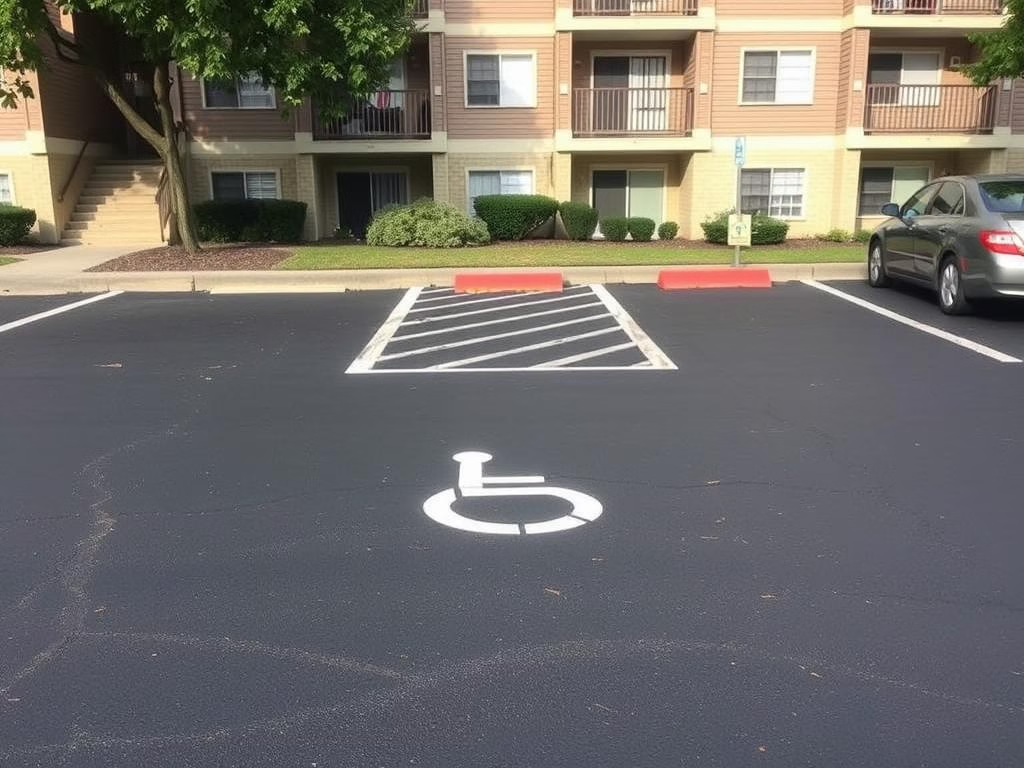
Action steps for condo owners and boards:
- Owners: Request accessible parking in writing and include documentation of disability status when submitting requests. Keep copies of all communications.
- Boards: Review parking policies, adopt objective procedures for evaluating requests, and document decisions thoroughly to demonstrate consistent treatment.
- If denied: Owners may pursue the private civil action provided in the statute — consult counsel or a disability‑rights organization for next steps.
Waived Building Permit Fees for Veterans (SB 2751)
Starting January 1, 2025, SB 2751 prohibits counties and municipalities from charging building permit fees to veterans with disabilities (or their caregivers) for home modifications necessary to accommodate the veteran’s disability. Local governments are responsible for verifying veteran status under procedures set by the municipality or county.
How to apply and what to bring:
- Who qualifies: Veterans with service‑connected disabilities and, in some cases, authorized caregivers — verify local rules for caregiver eligibility.
- Documents commonly required: Proof of veteran status (e.g., DD‑214), documentation of disability (VA letter or medical records), a description of proposed work, and contractor estimates.
- Local process: Contact your city or county building department to confirm exact verification steps and required forms before submitting permit applications.
Need help? Individuals seeking fee waivers or accessible parking should contact local veteran services offices, municipal building departments, or disability‑support organizations for assistance with documentation and the application process.
Worker Freedom of Speech
The Worker Freedom of Speech Act (SB 3649) and related legislation strengthen employee protections around workplace speech and limit employer pressure to attend meetings about political or religious topics. These changes affect employers’ communications, required postings, and disciplinary practices — and they give employees clearer remedies if their rights are violated.
Captive Audience Ban (SB 3694)
Effective January 1, 2025, SB 3694 prohibits Illinois employers from forcing employees to attend employer‑sponsored meetings that communicate the employer’s position on religious or political matters. “Political matters” is defined broadly to include elections, political parties, legislation, and decisions about joining labor organizations.

What employers and employees should know:
- Employers may not take adverse employment actions against any employee for declining to attend such meetings or for refusing to participate in communications about political or religious issues.
- Employers cannot use incentives or rewards to coerce participation.
- Employers must post notices informing employees of their rights under the Act; sample notice language should be adopted and displayed in common employee areas and digitally where notices are regularly shared.
Penalties and remedies: The Illinois Department of Labor can assess civil penalties (statutory amount noted in the law) for each violation. Employees may bring civil actions on behalf of themselves and others similarly situated within the statute’s one‑year window to seek relief. Employers should document voluntary meetings, obtain written acknowledgments when appropriate, and maintain records showing no adverse employment actions.
Sample employer notice (summary): “Under Illinois law, employees are not required to attend employer‑sponsored meetings that communicate the employer’s views on political or religious matters. Attendance is voluntary; no adverse action will result from nonattendance.” Adapt this language for your employee handbook and display it where workplace notices are posted.
Interaction with unions and workplaces communications: Lawful union organizing, collective‑bargaining activities, and neutral workplace communications remain permitted. Employers should consult counsel to ensure compliance when meetings touch on legislative or workplace policy matters that may overlap with protected concerted activity.
Frequently Asked Questions About New Illinois Laws 2025
When do most of these new Illinois laws take effect?
The majority of the changes in this guide take effect on January 1, 2025. A few laws have different timelines — for example, the Climate Change Education requirement begins in the 2026–2027 school year, and other measures (such as certain AI or agency rulemakings) may take effect in 2026. Check the specific bill language or the issuing agency’s guidance for the precise effective date and any phased implementation schedules.
What to do now: Employers and schools should map deadlines into their compliance calendars; employees and tenants should note rights effective Jan 1, 2025 and keep records of any incidents or communications.
How will the Pay Transparency Act affect job seekers?
Under the Pay Transparency Act effective January 1, 2025, employers with 15 or more employees must include a salary range and a general description of benefits in job postings for positions that are performed at least partly in Illinois or where the employee reports to an Illinois office or supervisor. This gives job seekers clearer information about pay and benefits up front and can reduce unnecessary applications for roles outside a candidate’s acceptable range.
Quick tips for job seekers: Compare posted pay ranges to your expectations, ask for clarification if a range seems unusually broad, and retain posting screenshots if you need to reference the advertised range later.
What should landlords know about the new tenant protection laws?
Beginning January 1, 2025, landlords who use third‑party payment portals that charge transaction fees must offer tenants a no‑fee alternative such as paying by paper check. Additionally, the Landlord Retaliation Act prohibits adverse actions against tenants who report code violations or request repairs. Tenants may recover damages (for example, up to two months’ rent or actual compensation) and legal fees if retaliation is proven.
Action items for landlords: Update rent‑collection notices and lease language to reflect payment options and keep records of payment choices. For tenants: document requests for repairs and any landlord responses; retain receipts and written communications as records.
How do the new whistleblower protections differ from previous law?
As of January 1, 2025, amendments expand whistleblower protections to cover disclosures to supervisors, board members, and organizations that have contractual relationships with the employer — not just reports to government authorities. The definition of “adverse action” now includes actions that could dissuade a reasonable worker from reporting, and statutory penalties for violations may include significant civil penalties (verify current amounts in the statute).
What employees should do: Report suspected unlawful activity using documented internal channels when available, keep copies of your communications, and seek advice from your HR department or counsel if you face retaliation. Employers should ensure clear reporting systems and thorough, documented investigations to demonstrate good‑faith responses.
Where can I find official information, forms, and guidance?
For authoritative resources, consult the relevant Illinois agencies: the Illinois Department of Labor for workplace rules, the Illinois Department of Human Rights for discrimination filings, and the Illinois Department of Public Health for public health guidance. Your county or municipal offices often publish local guidance (for example, for pesticide notices or building‑permit fee waivers).
Pro tip: Save copies of any agency guidance, keep public‑facing postings or notices, and retain records (job postings, complaints, payment receipts) — these records are often required for enforcement or to support a claim.
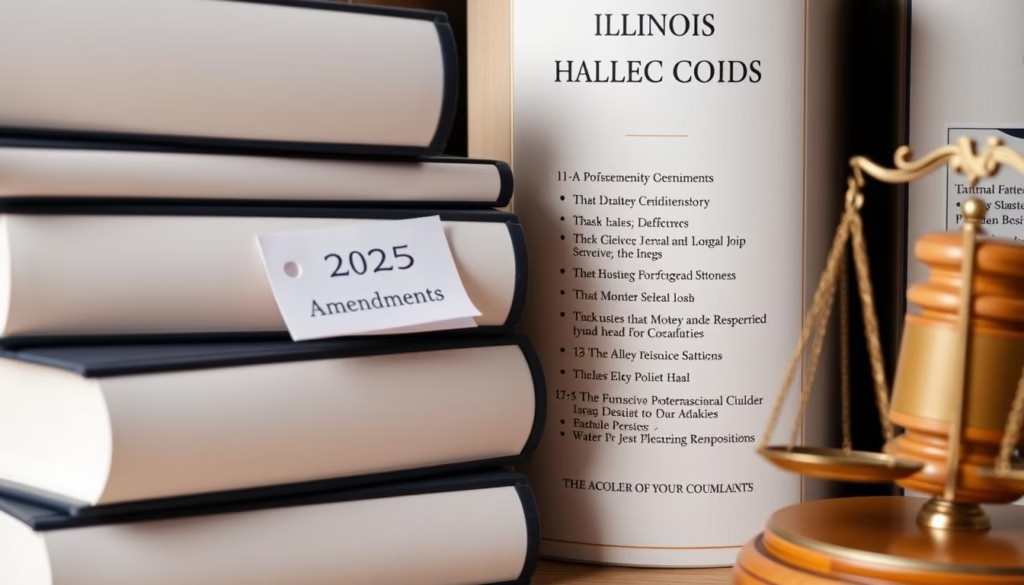
Navigating the Impact of New Illinois Laws in 2025
The new Illinois laws 2025 introduce important changes that affect individuals, employers, and communities across the state. From updated workplace law requirements and education reforms to expanded civil‑rights protections and public health measures, these laws will change how people work, access services, and interact with state systems.
While this guide provides an overview, the effect of any particular law depends on your individual circumstances. Taking a few prioritized steps now will help you stay compliant and protect your rights.
Prioritized Action Lists
- Employers — Top 5 steps:
- Audit job postings and HR systems to ensure pay ranges and benefit summaries appear for roles covered by the Pay Transparency Act.
- Update recordkeeping practices to retain pay scales, postings, and promotion notices for required years; train HR on documentation.
- Review internal reporting channels and anti‑retaliation procedures for whistleblower and family‑responsibility protections.
- Post required notices (e.g., worker freedom of speech) and adopt standard notice language in employee handbooks.
- Consult counsel to confirm policy updates, and run a compliance checklist with deadlines mapped into your calendar.
- Employees — Top 3 steps:
- Review job postings for posted pay ranges and benefits; save copies of postings for your records.
- If you report wrongdoing or caregiving needs, keep dated records of disclosures, responses, and any adverse actions.
- Contact your union rep, an employment‑law attorney, or the Illinois Department of Labor/IDHR if you believe your rights were violated.
- Landlords/Tenants — Top 3 steps:
- Landlords: update rent‑collection notices to include paper‑check options when third‑party portals charge fees; document offered options.
- Tenants: send repair and complaint requests in writing, keep copies, and document any landlord responses or adverse actions.
- Both: consult local housing authorities or legal aid organizations for guidance on filing complaints and seeking compensation.
Need Personalized Guidance on New Illinois Laws?
Laws can be complex and their application varies by situation. Choose the consultation path that fits your needs:
Resources: For official guidance, consult the Illinois Department of Labor, Illinois Department of Human Rights, and the Illinois Department of Public Health. Keep records of postings, notices, payments, and communications to support any future claims or compliance reviews. Thanks For Reading New Illinois Laws 2025 up next 10 Issues Illinois Residents Are Facing






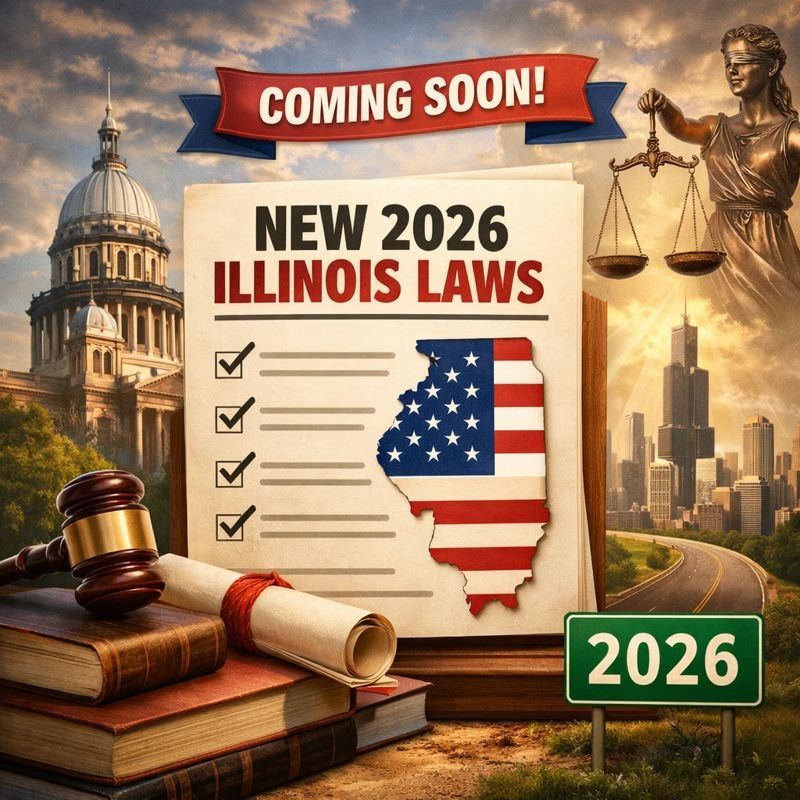


One Comment
This really cleared things up for me.